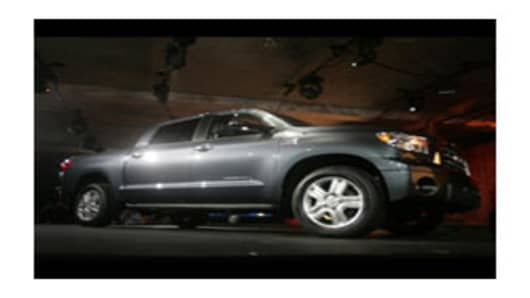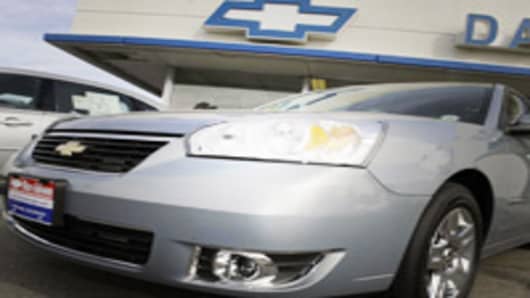Toyota Motor overtook Ford Motor to become the No. 2 automaker by U.S. sales in 2007, using new products and relentless strategy to break Ford's 75-year lock on the position.
Toyota sold 48,226 more cars and trucks than Ford, according to sales figures released Thursday.
Toyota's sales were up 3 percent for the year, buoyed by new products like the Toyota Tundra pickup, which saw sales jump 57 percent.
Ford's sales fell 12 percent, ending with a whimper a year that is expected to be the worst for the auto industry since 1998 as consumers fretted over high gas prices and the economy.
Ford corporate historian Bob Kreipke said it was the first time since 1931 that Ford wasn't second behind General Motors.
Meanwhile, General Motors said Thursday its U.S vehicle sales fell 5.2 percent in December as consumer demand softened amid a weak housing market and higher gas prices.
GM said it sold 319,837 cars and light trucks in the United States last month, down 4.4 percent from 334,501 vehicles a year earlier. Including heavier trucks, total vehicle sales were down 5.2 percent to 323,453 units in December, GM said.
Ford Motor, which has slipped to the No. 3 spot among U.S. automakers by sales, said Thursday its U.S. sales fell 9 percent in December.
Ford said it sold 212,094 vehicles in the United States in December, compared with 233,621 vehicles a year earlier.
Sales results for Ford included its import brands Volvo, Jaguar and Land Rover, and some medium- and heavy-duty trucks. Ford said its full-year sales for 2007 were down 12 percent from a year earlier at 2.57 million vehicles. (Related: Ford Looks to Sell Brands).
Retail sales through showrooms were down 10 percent for the year, while sales to corporate fleet operators declined 18 percent, Ford said. That included a 32 percent reduction in sales to rental car agencies, it said.
The automaker said that more than two-thirds of its sales decline in 2007 reflected discontinued vehicles, such as the now-scrapped older version of its Taurus sedan.
For December, Ford's retail sales were down 13 percent while its fleet sales were down 1 percent. Sales of Ford's market-leading F-Series pickup trucks were down 22 percent.
Ford repeated its forecast that industry-wide U.S. light vehicle sales could slip to an annualized rate of between 15.2 million and 15.7 million units in the first half of 2008.
GM Sees U.S. Sales Flat With 2008
GM said it delivered 3.87 million vehicles in 2007, down 6 percent compared with 2006.
In a talk before the results were released, General Motors Chief Executive Rick Wagoner said Thursday the company expects its overall 2008 U.S. auto sales to be about the same as the depressed levels of 2007.
Wagoner Looks Overseas
Wagoner's cautious outlook came as oil prices topped $100 per barrel, further darkening investors' sentiment for the battered auto sector. Shares of GM tumbled to a 19-month low in response.
In a potential setback for one of its highest-profile development efforts, Wagoner said GM might not make the planned 2010 launch of its heavily promoted new, all-electric vehicle the Chevy Volt.
Wagoner was speaking to reporters in an online chat session that kicked off a series of events marking GM's 100th anniversary. Major automakers, including GM, will release sales results for December and 2007 later Thursday.
"There are some obvious reasons for concern, but on balance I suspect '08 will be similar to '07 in total, although likely weaker in the first half and stronger in the second," Wagoner said in response to a question on his outlook for U.S. vehicle sales.
He added: "In the U.S., we expect (overall sales in the) low 16 millions, but some risk given the economic background."
Wagoner said GM projected that about 80 percent of the industry's sales growth over the next five years would come from emerging markets. Global sales in 2008 were on track to hit a record of between 74 million and 75 million vehicles in 2008, he said.
"We see continued strong growth in major emerging markets like China, India, Russia, and throughout South America," he said.
Wagoner said it was possible that tougher U.S. fuel economy standards could force automakers to narrow their product offerings, stepping back from the larger trucks and SUVs -- a sector that Detroit-based automakers has dominated.
A recently enacted change in Corporate Average Fuel Economy (CAFE) standards requires automakers to hit a fleetwide fuel efficiency benchmark of 35 miles per gallon by 2020.
"The rules will be tough for everyone in the industry," Wagoner said. "We're working this issue very aggressively."
"But it's certainly possible that the new CAFE regulations could limit the range of vehicles offered in the marketplace over time, " he added.
Most analysts expect that U.S. vehicle sales ended 2007 on a weak note. Many see overall industrywide sales near 16.1 million for 2007, the lowest level since 1998.
The 2008 sales outlook is seen hinging in part on whether the housing crisis runs longer and cuts deeper into consumer spending and pushes the U.S. economy into recession.
Many analysts have said 2008 U.S. auto sales could slump to near 15.5 million vehicles on an industrywide basis.
Volt Gets 'Massive Resources'
Charging GM's Volt
Wagoner said GM had dedicated "massive resources" to the launch of the Volt, which is being designed so it can be recharged at a standard electric outlet.
But he said there was no "guarantee" that GM would reach its aggressive goal of launching the groundbreaking vehicle in 2010.
In November, Bob Lutz, GM's head of global product development, said the automaker was on track to launch the Volt by November 2010, setting the stage for what he called a "showdown" with Toyota. That car maker's rapid growth has put it on track to overtake GM as the world's largest automaker, perhaps as soon as 2007 global results are tallied.
Wagoner called the battle for the industry's top spot a "race," but said GM would focus on implementing its established business plan regardless of the sales rankings for the past year.
Yearly Auto Sales Seen Lower
On an annualized basis, the December auto sales tally is expected to come in weaker than the sales rate of 16.1 million forecast for all of 2007. That would highlight the risk that vehicle sales in 2008 may slump further than the 15.5 million rate predicted by many analysts.
"The long-resilient American consumer, increasingly mired in the worst housing downturn in two decades, is likely to slow purchases of big ticket items like automobiles -- a view seemingly supported by recent sharp reductions in consumer confidence," said Bear Stearns analyst Peter Nesvold in a note to clients.
New U.S vehicle sales for December are expected to come in at a seasonally adjusted annual rate of between 15.4 million and 15.9 million vehicles, according to analysts. That would be
down from last December's 16.7 million vehicle rate and the 16.2 million rate posted in November.
Full-year 2007 light vehicle sales should be about 16.1 million, the lowest since 1998, analysts said.
"We expect 2008 vehicle sales to fall further, as participants in the automotive economic cycle are likely to go back to the older recession playbook," Lehman Brothers analyst Brian Johnson said, adding that automakers may not step up incentives but let production fall and use "the opportunity to further reduce structural costs."
In December, sales of General Motors are expected to decline in the range of 6 percent to 13 percent. while most analysts expect, while sales of Chrysler are expected to fall about 8 percent, according to analysts.
More Results
Japanese rival Honda MotorThursday posted U.S. sales for December that were almost flat from a year earlier.
The Japanese automaker said it sold 131,792 vehicles in the United States last month, including results for its luxury Acura brand. That compared with 131,778 vehicles a year earlier, Honda said.
On a full-year basis, Honda said its 2007 sales were up 2.5 percent from 2006.
Edmunds, which tracks the industry, said U.S. manufacturers' market share likely dropped to 52.3 percent in 2007 from 55.2 percent in 2006 with Japanese automakers picking up most of that lost share.
Honda's market share last year grew from 9.1 percent to 9.7 percent while Toyota's climbed from 15.3 percent to 16.3 percent, according to Edmunds.
Nissan Motor said on Thursday its U.S. sales fell 2.4 percent in December. Sales for Nissan-brand vehicles fell 2.2 percent, while sales for the automaker's luxury Infiniti unit were down 3.5 percent from a year earlier in December, Nissan Senior Vice President for U.S. Sales Mark McNabb told Reuters.
On a full-year basis, Nissan's U.S. sales were up 4.5 per cent in 2007, McNabb said.
-- Associated Press and Reuters contributed to this report.






